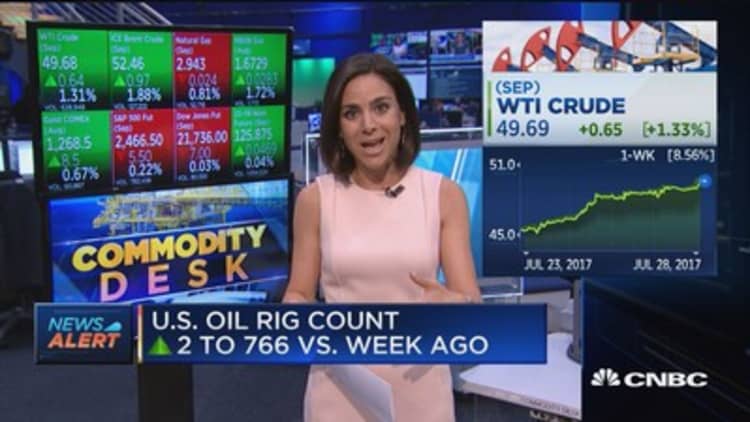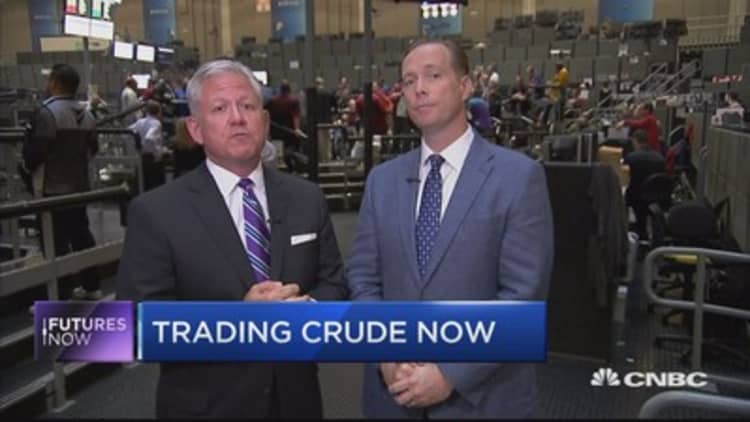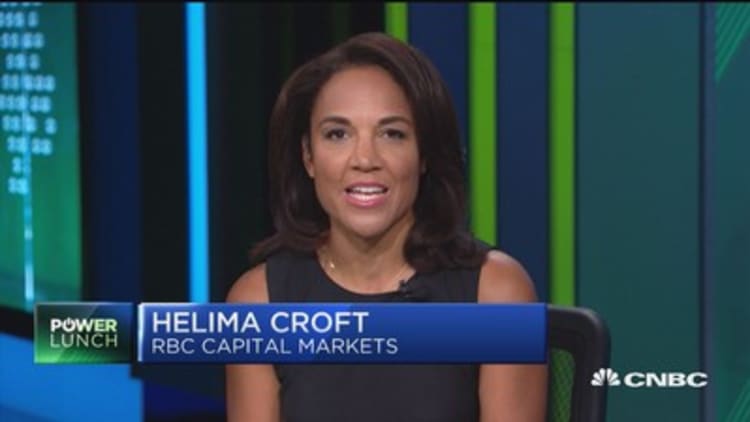
U.S. oil prices surged toward the key $50-a-barrel level this week, but the rally likely has little gas left in the tank, analysts say.
West Texas Intermediate crude futures tacked on about $4 a barrel, or 8.6 percent, this week to $49.71 for their best weekly performance all year. International benchmark rose about 9 percent this week, topping $52 a barrel.
Saudi Arabia's vow on Monday to cut exports in August helped kicked off the rally, while a sharp drop in U.S. crude and fuel stockpiles kept the rebound going.
U.S. crude oil's July performance
There is fundamental support for the rally to some degree, said Tamar Essner, director of energy and utilities at Nasdaq Corporate Solutions. Wednesday's U.S. stockpile report marked an inflection point because inventories fell below year-ago levels, she said.
But despite the move to the top of crude's recent trading range, Essner and other analysts expect prices to remain stuck between $42 and $55 a barrel.
U.S. crude futures prices over the next year remain relatively flat. The 12-month strip price likely won't rise above $50.15, according to Roberto Friedlander, head of energy trading at Seaport Global Securities. His analysis of charts shows a "head and shoulders" pattern, which indicates an upward trend is running out of steam.
Oil prices also crossed their 200-day moving averages, a key resistance level, meaning it will be harder to post further gains, said Matt Smith, director of commodity research at ClipperData.
"From a technical perspective, it seems as though this rally should be done," Smith told CNBC.
One development that may help is Brent crude's flip into backwardation, when the price for immediate delivery of crude is higher than the price of contracts for future delivery. That makes it less attractive to keep oil in storage, which in turn helps to draw down huge stockpiles of oil that have weighed on the market, Smith said.

Saudi Arabia's vow to cut oil exports in August to the lowest level this year also stands to help on that front, according to Smith. Already, the top oil exporter's promise to cut shipments to the United States has helped to reduce stockpiles there, he said.
OPEC and other oil exporters have limited their production since January in order to balance oil markets, but exports have not fallen as quickly, leaving many storage facilities brimming with crude. Saudi Arabia this week signaled it wants OPEC to tackle exports more aggressively, and Kuwait and the United Arab Emirates expressed support.
But it's unlikely that many other producers will commit to further limits on their oil industries, Smith said. Meanwhile, a rebound in output continues in Libya and Nigeria, two OPEC members exempt from the deal to cut production.
"I don't see the physical market getting all that much better. There's still a lot of crude that's unsold, still a lot of Nigerian barrels floating out there," said John Kilduff, founder at energy hedge fund Again Capital.
Still, investors have rushed in to make bets that oil prices will rise, he said.
But recent moves by drillers indicate they don't see oil prices rising much further. While oil companies previously waited to hedge production until oil prices hit about $52 a barrel, Kilduff said some are now willing to lock in prices for future delivery at about $50 a barrel.

Analysts point to one big variable that could push oil prices higher: Venezuela.
The oil-producing nation's embattled president, Nicolas Maduro, could advance plans this weekend to rewrite the constitution, a move that could spark crippling street protests and international sanctions. That would potentially push state oil giant PDVSA into default, cripple its ability to operate, and tank the country's already declining output, RBC Capital Markets said in a research note on Friday.
It could also lead to a drop of 720,000 barrels a day into the United States, Helima Croft, global head of commodity strategy at RBC, told CNBC on Friday.


